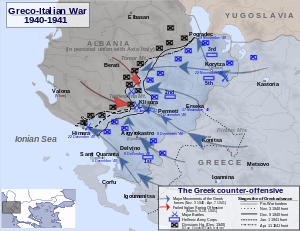Battle of Himara
| Battle of Himara | |||||||
|---|---|---|---|---|---|---|---|
| Part of the Greco-Italian War | |||||||
 Map of Greek counter-offensive, 13 November 1940 – 7 April 1941 |
|||||||
|
|||||||
| Belligerents | |||||||
|
51st Infantry Division Siena |
3rd Infantry Division 3/40 Evzone Regiment |
||||||
| Commanders and leaders | |||||||
|
Georgios Bakos Thrasyvoulos Tsakalotos |
|||||||
The Battle of Himara (Greek: Η Μάχη της Χειμάρρας) was a military conflict that took place in the Greco-Italian War in December 1940, during the counteroffensive of the Greek Army that followed the failed Italian invasion of Greece. After the Greek victory in Himara, the Italian dictator Benito Mussolini, admitted that one of the causes of the Italian defeat was the high morale of the Greek troops.
The Italian Army, initially deployed on the Greek–Albanian border, launched a major offensive against Greece on 28 October 1940. After a two-week conflict, Greece managed to repel the invading Italians in the battles of Pindus and Elaia–Kalamas. Beginning on 9 November, the Greek forces launched a counteroffensive and penetrated deep into Italian-held Albanian territory all over the front. As a result, the Greek forces entered the cities and towns of the region one after another: Korçë, on 22 November, Pogradec, on 30 November, Sarandë, on 6 December and Gjirokastër, on 8 December.
On 13 December, Porto Palermo, a coastal village south of Himara came under the control of the Greek forces. Two days later, the Greek 3rd Infantry Division continued the offensive toward Himara. However, the advance was slowed down due to heavy enemy counter-action, supported by air force raids, as well as extremely harsh weather conditions. On 19 December, the Greek forces after a hard fight captured the Giami height. Meanwhile, at the dawn of same day, the 3/40 Evzone Regiment (Colonel Thrasyvoulos Tsakalotos) launched, without artillery preparation, a surprise attack against the Italian troops at Mount Mali i Xhorët (or Mount Pilur), a strategic spot east of Himara. The Evzones of the regiment, after being informed about the topography of the region by locals, performed a charge with fixed bayonets from various positions against the Italian garrison.
...
Wikipedia
